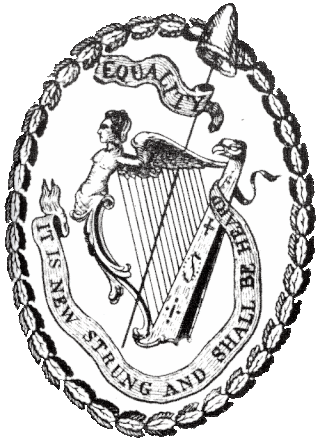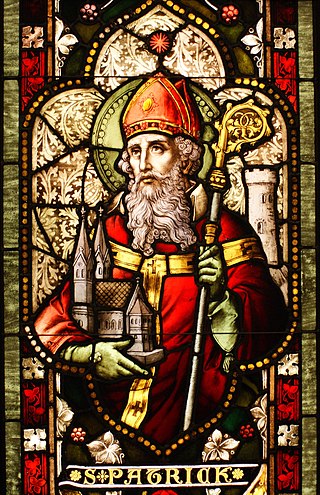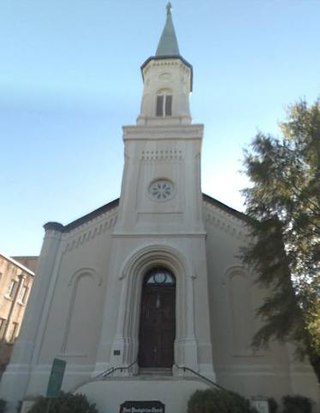
Ian Richard Kyle Paisley, Baron Bannside, was a Northern Irish loyalist politician and Protestant religious leader who served as leader of the Democratic Unionist Party (DUP) from 1971 to 2008 and First Minister of Northern Ireland from 2007 to 2008.

Armagh is the county town of County Armagh and a city in Northern Ireland, as well as a civil parish. It is the ecclesiastical capital of Ireland – the seat of the Archbishops of Armagh, the Primates of All Ireland for both the Roman Catholic Church and the Church of Ireland. In ancient times, nearby Navan Fort was a pagan ceremonial site and one of the great royal capitals of Gaelic Ireland. Today, Armagh is home to two cathedrals and the Armagh Observatory, and is known for its Georgian architecture.

The Society of United Irishmen was a sworn association in the Kingdom of Ireland formed in the wake of the French Revolution to secure "an equal representation of all the people" in a national government. Despairing of constitutional reform, and in defiance both of British Crown forces and of Irish sectarian division, in 1798 the United Irishmen instigated a republican rebellion. Their suppression was a prelude to the abolition of the Irish Parliament in Dublin and to Ireland's incorporation in a United Kingdom with Great Britain. An attempt, following the Acts of Union, to revive the movement and renew the insurrection led to an abortive rising in Dublin in 1803.
The Protestant Unionist Party (PUP) was a unionist political party operating in Northern Ireland from 1966 to 1971. It was the forerunner of the Democratic Unionist Party (DUP) and emerged from the Ulster Protestant Action (UPA) movement. It was founded and led by Ian Paisley, who also founded and led the Free Presbyterian Church of Ulster.

The Non-subscribing Presbyterian Church of Ireland is a non-creedal Christian Church, which maintains a great emphasis on individual conscience in matters of Christian faith.
The World Alliance of Reformed Churches (WARC) was a fellowship of more than 200 churches with roots in the 16th century Reformation, and particularly in the theology of John Calvin. Its headquarters was in Geneva, Switzerland. They merged with the Reformed Ecumenical Council in 2010 to form the World Communion of Reformed Churches.
The Ulster Constitution Defence Committee (UCDC) was established in Northern Ireland in April 1966 as the governing body of the loyalist Ulster Protestant Volunteers (UPV). It coordinated parades, counter demonstrations and paramilitary activities in order to maintain the status quo of the government, lead a campaign against the reforms of Terence O'Neill and stymie the civil rights movement.
Christianity is the largest religion in Northern Ireland. At the 2021 census, the prevalence rates for the main religions were: Catholic ; Presbyterian ; Church of Ireland ; Methodist ; Other Christian or Christian-related denominations ; other Religions and Philosophies ; those declaring no religion and religion not stated. The Catholic Church has seen a small growth in adherents, while the other Christian groups have seen a small decrease.
The Evangelical Protestant Society (EPS) is a pressure group representing Christian evangelicalism in Northern Ireland. It was founded in Belfast in 1946 and opposes what it terms "liberalism and false ecumenism", "Romanism" and "Popery".

Christianity is, and has been the largest religion in Ireland since the 5th century. After a pagan past of Antiquity, missionaries, most famously including Saint Patrick, converted the Irish tribes to Christianity in quick order, producing a great number of saints in the Early Middle Ages, and a faith interwoven with Irish identity for centuries since − though less so in recent times.
The Evangelical Presbyterian Church is a Calvinist, Christian evangelical denomination that is found only in Northern Ireland, where it is the smallest of the Presbyterian churches. It was formed on 15 October 1927 by Rev. James Hunter (1863–1942), former minister of Knock Presbyterian Church (Belfast), and James (W.J.) Grier, a former student at the Assembly's College. They were joined by others who seceded from the Irish Presbyterian Church.

The Presbyterian Church in Ireland is the largest Presbyterian denomination in the Republic of Ireland, and the largest Protestant denomination in Northern Ireland. Like most Christian churches in Ireland, it is organised on an all-island basis, in both Northern Ireland and the Republic of Ireland. The church has approximately 210,000 members.

Hugh Hanna, nicknamed Roaring Hanna, was an Presbyterian minister in Belfast known for his anti-Catholicism.

First Presbyterian Church is a historic Presbyterian church in Macon, GA.
The Caleb Foundation, created in 1998, is a creationist pressure group in Northern Ireland. It also lobbies on a range of social policy issues such as abortion and same-sex marriage from an evangelical Protestant perspective, and has been particularly influential with Democratic Unionist Party ministers in the Northern Ireland Executive. The organisation has described its mission as "promoting the fundamentals of the historic evangelical Protestant faith".

The Temperance movement in Ireland was an influential movement dedicated to lowering consumption of alcohol that involved both Protestant and Catholic religious leaders.

Drum is a village and townland in the west of County Monaghan in the Republic of Ireland. It is notable for being one of the only Protestant-majority settlements in the Republic of Ireland.

Rev Robert James Patterson B.A LL.B was an Irish Presbyterian minister, social reformer, and the founder of the worldwide Catch-My-Pal Total Abstinence Union. He was born in Whitecross, County Armagh and was brought up by his Aunt and Uncle in Bray, County Wicklow.












